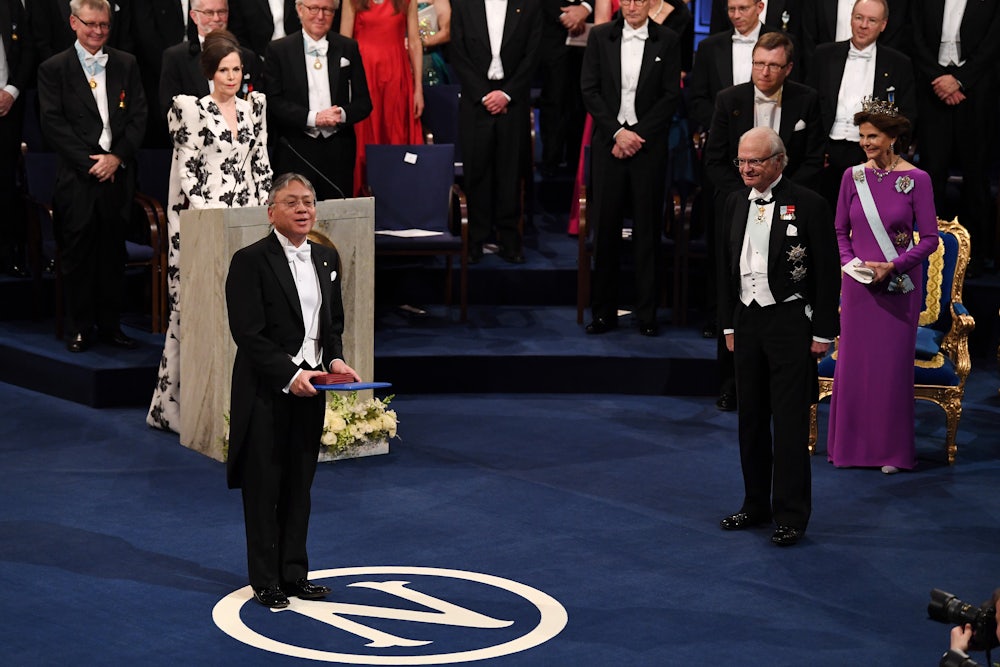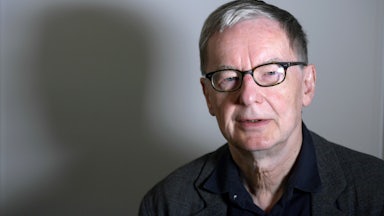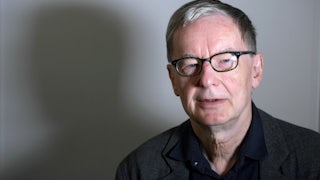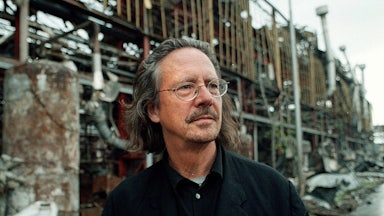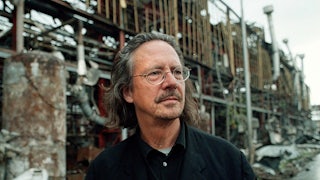When Dario Fo, an internationally obscure Italian political satirist and literal clown, won the Nobel Prize in literature 25 years ago, the organizers of the prize told Fo’s publisher that giving it to a bigger name—say, Salman Rushdie or (the, incredibly, still alive) Arthur Miller—would have been “too predictable, too popular.” This essentially summed up the long-standing reputation of the Nobel Prize in literature: The Nobel Prize Committee was renowned for trawling across Europe (mostly) for worthy but often obscure writers; there was, as in Fo’s case, often a political dimension, as well, with the Swedish Academy’s own leftish politics often reflected by its laureates.
Today’s Nobel Prize in literature is clearly not the same prize that Fo won—it’s not even the same prize that the French novelist Patrick Modiano won in 2014. The Nobel remains the most prestigious cultural prize in the world, despite all the recent controversies and scandals. In recent years, its identity has become unmoored amid oddball picks (Bob Dylan), conventional ones (Olga Tokarczuk), and the literary award equivalent of begging to get ratioed on Twitter (Peter Handke). With all the left turns and overcorrections, it’s not so obvious what the Nobel Prize in literature is celebrating.
The prize’s recent history doesn’t offer much insight into its trajectory—the past few years offer a muddle of competing ideas. When I asked the Swedish journalist, novelist, and Nobel watcher Jens Liljestrand who he thought would win, he wrote, “No one really knows anymore, and it’s hard to see the logic. After Dylan—a pop culture icon? Ishiguro—a Booker Prize–winning novelist? Louise Glück—an elite niche poet? How does this system work?” And where does it go from here? Should the prize continue to reward obtuse and obscure writers of dense prose? Should it take applications via Medium? Should it become the first literary award given out to an influencer? (An actual influencer, not an aspiring one like Salman Rushdie or the people he D.M.s on Instagram at 2 a.m.)
Still, for all the uncertainty, three data points may help the armchair Nobel Prize speculator. The first is the identities of the three most recent laureates. Back in 2017, after Ishiguro won, I wrote that the Nobel Prize was becoming more populist and fun and was exploring different modes of literature, like Svetlana Alexievich’s oral histories and Bob Dylan’s collaborations with ELO’s Jeff Lynne. I was wrong about that. The prize was canceled—in the old sense of the word, though sort of in the new sense, too—the following year, and seven members of the academy resigned. Since returning, the academy has made three capital-L literature choices in a row: Tokarczuk, Handke, and Glück. In my interview with Nobel Prize Committee Chair Anders Olsson, he stressed this again and again: The Academy is focused exclusively on literary merit and nothing else. This is why Handke’s abysmal politics weren’t disqualifying; it’s also why one probably shouldn’t expect another offbeat choice like Bob Dylan—though, to be fair, I should not be trusted when it comes to Dylanology and the Nobel Prize. In any case, we have had three consecutive winners who might be called “writers’ writers.”
The Nobel Prize’s abysmal record on diversity is a second guide star for speculators. Though the prize has been awarded 117 times, only 16 women have won. A Black African writer has not won in my lifetime. The prize has been awarded to Europeans 14 times this century—this despite the Nobel Committee’s vocal emphasis on greater diversity and its quasi-public apologies for the prize’s well-earned reputation for Eurocentrism. With this in mind, the likelihood of the next Nobel Prize in literature being awarded to a non-European and non-American should be exceedingly high. Should. For all the talk of righting this ship, however, it’s clear that the Nobel Committee is going to do whatever it wants and that what it wants is to award a dour novelist writing lyrical reflections about an affair they had during World War II with a 15-year-old girl, preferably in French.
Naturally, the third and most important data point is that you should never, under any circumstances, listen to what I have to say. I am not only not good at this, I am exceedingly bad. I never get this right and often get it very wrong. With that in mind, here are some entirely too strong predictions about who has a chance and who doesn’t. (A quick note on methodology: Odds come from Ladbrokes and are accurate as of late Monday evening.)
Betting Favorites Who Actually Have a Shot
- Annie Ernaux (French memoirist, 9–1 odds)
- Lyudmila Ulitskaya (Russian novelist, 11–1 odds)
- Ngũgĩ wa Thiong’o (Kenyan novelist and perennial Nobel bridesmaid; 11–1 odds)
- Maryse Condé (Guadeloupean novelist; 15–1 odds)
- Nuruddin Farah (Somali novelist; 17–1 odds)
Five years ago, after saying that Bob Dylan not only would not win the Nobel Prize but that he would never, ever win it, I went on the BBC to defend my honor. Asked, at the end, who I thought would next year, I was emphatic: Ngũgĩ wa Thiong’o, arguably Africa’s greatest living novelist. I have, as always, been proven wrong again and again and yet, I will say it again: This may very well be Ngũgĩ’s year! Here’s hoping.
I don’t feel particularly confident about any of the other options. Ernaux has all of the momentum at the moment—her name has come up in every conversation I’ve had with well-connected Scandinavians and in many of the emails and D.M.s I get from readers. This current iteration of the academy seems more conservative with regards to form than the version that awarded the prize to Dylan and Alexievich, which would seem to make selecting a memoirist unlikely, even one of Ernaux’s unimpeachable literary merit. Nevertheless, there is undeniable energy behind her candidacy. (Also, if Winston Churchill can win as a nonfiction writer for his My African Journey, surely Annie Ernaux can win for her pamphlet-size excavations of her own past.) Lyudmila Ulitskaya is a classic Nobel laureate—she has, in recent years, tangled with the Russian state—but I’m skeptical of her chances. There’s simply too much literary and geographical overlap with two other recent laureates, Alexievich and Tokarczuk. Maryse Condé and Nuruddin Farah, like Ngũgĩ, are perennial favorites for those looking for a non-European candidate to bet on.
These Non-Europeans Might Also Have a Shot
- Can Xue (Chinese novelist; 21–1 odds)
- Yan Lianke (Chinese novelist; 21–1 odds
- Scholastique Mukasonga (French-Rwandan novelist; 26–1 odds)
- Xi Xi (Chinese novelist; 26–1 odds)
- Yu Hua (Chinese novelist; 34–1 odds)
Last year, the bettors were convinced that one of these five writers would win, but seem to have soured on them this year. Why? I honestly have no idea, though I am personally more confident this year than last year—particularly about Can Xue. Interestingly, the Handke controversy might play into the Nobel Prize Committee’s thinking. The decision to award China’s last Nobel literature laureate, the comic novelist Mo Yan, proved immensely controversial, given Mo’s coziness with Beijing. Will it risk a reverse firestorm by awarding a critical satirist like Yan Lianke? Or play it safer with the uncategorizable and (mostly) apolitical Can Xue? Mukasonga, meanwhile, is an intriguing candidate but a true long shot given that she only published her first book in 2006.
What If the Nobel Prize Only Goes to Europeans From Now On?
- Jon Fosse (The Norwegian’s Norwegian; 15–1 odds)
- Javier Marias (Leg guy; 17–1 odds)
- Hélène Cixous (One of the millions of French literary theorists; 17–1 odds)
- Dubravka Ugrešić (Croatian writer who gets mad when you call her a Croatian writer; 17–1 odds)
- Edna O’Brien (Irish novelist I have been trying to come up with a joke about for six years; 26–1 odds)
- Botho Strauss (German playwright who is a little too concerned with questions of blood and ethnicity; 33–1 odds)
- Milan Kundera (Living novelist most likely to publish a posthumous book-length screed against cancel culture; no odds)
- Ivan Klíma (Philip Roth’s Czech wingman; no odds)
- Mircea Cărtărescu (Romanian novelist who I will personally will toward a Nobel Prize; no odds)
- Ismail Kadare (A founding member of the all-powerful Albanian Alliance, alongside Dua Lipa, Rita Ora, and Bebe Rexha; no odds)
- László Krasznahorkai (Second-most demanding Hungarian novelist in translation; no odds)
- Péter Nádas (Most demanding Hungarian novelist in translation; no odds)
The Nobel Prize in literature is as European as diesel gas and taking the idea of “Switzerland” seriously. If the Nobel Prize Committee decides to award a luminary of European literature, they will select someone on the above list. Fosse, as ever, remains a hugely deserving candidate, and it has been 10 years since a Scandinavian has won the Nobel Prize in literature. But is the academy aware that Fosse was Karl Ove Knausgaard’s creative writing teacher? If they are, he’s unlikely to survive the blemish. (“Just write! Never revise!” is apparently the mantra in Norwegian creative writing classes.) Bettors have a weird idea that Hélène Cixous is going to win, but there is simply no way that the academy would reward a literary theorist—they aren’t above much, but they are above that. Given the academy’s recent bent toward the ruminative, inhibited, and serious, Marias’s tendency toward the ruminative, uninhibited, and horny might end up as a strike against him. Krasznahorkai would win if the people who look forward to this list every year were in charge of the Nobel Prize in literature. Unfortunately, they’re all unemployed.
These Europeans Definitely Aren’t Going to Win
- Michel Houellebecq (Living novelist most likely to publish a book-length screed against cancel culture like next week; 21–1 odds)
- Karl Ove Knausgaard (Frequent interview subject; 26–1 odds)
- Sally Rooney (Infrequent interview subject; no odds)
- Elena Ferrante (Increasingly frequent interview subject; no odds)
It is, I suppose, incredible that only one of these writers is the subject of a bucket hat. The Sally Rooney hat is, I think, one of the great literary jokes in recent memory: An author writes an entire book about being uneasy with fame, and her publisher responds by turning that book into merch. (To say nothing of the insane collaboration with Graydon Carter’s jobs program for Cazzie David. Also I swear I saw a tweet about mid-aughts New Musical Express phenomenon Kaiser Chiefs checking out the Sally Rooney pop-up shop, a combination of nouns that haunts me to this day.) And yet, don’t all these writers deserve their own swag? One can easily imagine it: a stained leather jacket for Knausgaard; an “It’s a Ferrante Thing … You Wouldn’t Understand” T-shirt for Ferrante (this is a real thing); a rotting liver for Houellebecq. (Actually, a bucket hat also works for Houellebecq, a man who looks like a creepy French baby, if that baby were also holding a cigarette, which is, unfortunately, something many French babies do.)
Britain Doesn’t Have Any Gasoline, and It Also Isn’t Going to Have Any Nobel Prizes
- Hilary Mantel (Writer of the Marvel Cinematic Universe but for even more humorless nerds—historians; 34–1 odds)
- Salman Rushdie (First but definitely not the last Nobel contender with a Substack; 51–1 odds)
- Martin Amis (The Nobel Committee should wait until his “two longish stories, one about lynching and one about slavery just before the Civil War” are published; 51–1 odds)
- Ian McEwan (Novelist most likely to publish books narrated by a ferret, a Cambridge Analytica algorithm, and the Constitutional Reform Act 2005, respectively; no odds)
- Julian Barnes (Subtle, erudite, and cosmopolitan English novelist—all qualities that make him unlikely to win this year; no odds)
- Tom Stoppard (Guy who wrote the weird father-son-Nazi love-triangle stuff in Indiana Jones and the Last Crusade; no odds)
- David Mitchell (Second-best David Mitchell; no odds)
- J.K. Rowling (The “J.K.” stands for “Joyce Karen”; no odds)
There is a simple reason why none of these people will win, which is that three of the last five Nobel laureates have written in English. The slightly less simple reason is that Britain’s best candidate for the Nobel Prize in literature, Kazuo Ishiguro, won it in 2017, presumably to the considerable chagrin and/or rage of many of the above writers. And yet there is an argument that a British writer should win the Nobel Prize in literature this year, if only so Boris Johnson can seize it and then try to trade it for food, water, or “petrol,” which is a fancy word for “Shell V-Power NiTRO+ Premium Gasoline.”
There is No Chance in Hell That Any of These Americans Win
- Jamaica Kincaid (Antiguan-American novelist and plant enthusiast; 13–1 odds)
- Don DeLillo (Would benefit from some good publicity before the Noah Baumbach adaptation of White Noise is released; 17–1 odds)
- Cormac McCarthy (Ridley Scott collaborator; 34–1 odds)
- Marilynne Robinson (The fading paint on a Lutheran church, somewhere between Des Moines and Iowa City; 34–1 odds)
- William T. Vollmann (Where would they even reach him to give him the news? An abandoned signal tower somewhere in the Mazatzal Mountains? A defunct message board dedicated to daguerrotype pornography? 51–1 odds)
- Stephen King (Founding member of the Rock Bottom Remainders; 51–1 odds)
- Thomas Pynchon (Would win if there were a God, but God is dead; no odds)
- Joan Didion (First but definitely not the last Nobel contender with their face on a popular tote bag; no odds)
- Joyce Carol Oates (Plastic skeleton critic; no odds)
- Francis Fukuyama (Extreme plastic skeleton critic; no odds)
- Jonathan Franzen (Please rate “Mr. Difficult” five stars on Apple Podcasts; no odds)
- Dave Eggers (A shoo-in for the Nobel Prize in #Resistance literature; no odds)
After years spent ignoring America’s great postwar novelists—DeLillo, Pynchon, and, most of all, Philip Roth—the Nobel Prize Committee has honored two Americans in the past five years: a singer-songwriter and a poet. Who says the Swedes don’t have a sense of humor? (By this logic, the next American winner will in fact be a stand-up comedian. Just imagine it: Nobel laureate Denis Leary.) Anyway, there is no chance that an American wins this year: We are not making it three-in-six. It’s not happening.
But what if? There’s always hope. Perhaps Don DeLillo’s new fiction about iPhones resonates in Northern Europe. In any case, his depressing novels about how America sucks deserve the prize, even if Thomas Pynchon’s funny ones on the same subject deserve it more. The Nobel Prize Committee is, like the rest of us, waiting for Cormac McCarthy’s long-delayed and probably nonexistent next book, The Passenger, but he’s unlikely to win, given the dark forest that hums over the horizon, the flames of the campfire sawing in the wind, the pale streaks of light seeping through the sky, and also because the Nobel Prize Committee really hated James Franco’s adaptation of Child of God.
I have, in the past, written several mean things about Joyce Carol Oates’s Twitter feed, suggesting that her insane and occasionally offensive tweets were enough to disqualify her from the Nobel Prize. Well, sometime during the pandemic I became fully Joyce-pilled and now find her to be an odd and delightful (though still sometimes offensive) presence. I’m sorry, Joyce. You’re funny. But you’re not going to win the Nobel Prize in literature.
Eggers and Franzen are here to remind us that the old generation that has dominated Nobel Prize speculation for decades is fading and that a new generation is rising up. In America, we are in the midst of the Franzenaissance, but multiple Swedish people have laughed in my face when I suggested he would make his entry into top-tier Nobel Prize speculation after Crossroads. And that’s just about speculation. Nobody thinks he’s winning the Nobel.
What About a Canadian?
- Margaret Atwood (Even she didn’t realize Hulu’s The Handmaid’s Tale was now on season 5; 11–1 odds)
If you want to know how seriously Ladbrokes takes the Nobel Prize in literature and Canadian literature, look no further than this: Margaret Atwood’s name is spelled “Margaret Attwood” on its website.
These Non-Europeans Definitely Aren’t Going to Win
- Haruki Murakami (T-shirt anthologist; 5–1 odds)
- Ko Un (Canceled South Korean poet; 34–1 odds)
Here are two things I believe. The first is that the whole Sally Rooney bucket hat thing was cooked up as a psy-op by Penguin Random House—which somehow persuaded Farrar, Straus and Giroux that literary millinery was the future of marketing—to distract from PRH’s far more embarrassing clothing-themed item: a book by Haruki Murakami about his T-shirt collection. Just in case you missed that: The new Murakami book is literally a collection of photos of his shirts, with descriptions of said shirts. It is called Murakami T: The T-Shirts I Love. This is a new low for literature. (There is also, incredibly, an unrelated Uniqlo T-shirt collaboration.) Anyway, the second thing I believe is that, shirts notwithstanding, Haruki Murakami is not going to win the Nobel Prize, not this year and probably not ever. (Maybe he will win when the Nobel Committee is made up primarily of Gen-X audio fidelity enthusiasts.) Murakami remains the betting favorite because he is among the most popular writers of literary fiction. And yet his status as—arguably—the most famous international writer of literary fiction is almost certainly what will keep him from winning the Nobel. The one thing that gives me pause is that after Tokarczuk, Handke, and Glück, we are probably due for a popular writer. But still, this isn’t Murakami’s year. In any case, Sweden doesn’t really have ideal T-shirt weather.
As for Ko Un, he remains a cautionary tale about using Nobel Prize betting odds as a guide for figuring out who will actually win the Nobel Prize. Ko Un has remained a betting favorite despite the fact that a sexual harassment scandal caused him literally to be removed from South Korean textbooks. Yes, in a post-Handke world anything is possible. But Ko Un is not going to win the Nobel Prize in literature.
These Poets Are Not Going to Win
- Anne Carson (Canadian poet, playwright, translator, essayist, ancient deity, shadow on the wall, copse of trees swaying gently in the wind, 8–1 odds)
- Charles Simic (American poet; 26–1 odds)
- Homero Aridjis (Mexican poet; 26–1 odds)
- Linton Kwesi Johnson (Jamaican dub poet; 34–1 odds)
I’ll be honest: Carson intrigues me, and in various drafts of this piece I have included her as a favorite. She should be undone by two simple facts: She is a poet and she writes in English. And yet, is Carson a poet? Does she write in English, or do the strange markings she makes on a woodblock before sending to New Directions (which then packages them as a special edition retailing at $74.99) simply happen to appear to be written in English? No one seems to know what she is, though my understanding is that the Democrats have earmarked several million dollars in the budget reconciliation bill for research to find out. In any case, the poets (all of them) somehow managed to get even more annoying after Glück won, and the world is screwed up enough right now. The last thing we need is two Nobel Prize–winning poets in a row. It’s not happening!
But These Non-Europeans Just Might Win …
- Mia Couto (Mozambican novelist; 21–1 odds)
- Ivan Vladislavic (South African novelist; 26–1 odds)
- Zoë Wicomb (South African novelist; 33–1 odds)
- Ibrahim Kuni (Libyan novelist; no odds)
- Adonis (Syrian poet; no odds)
- Sonallah Ibrahim (Egyptian novelist; no odds)
- Banana Yoshimoto (Japanese novelist; no odds)
- Hoda Barakat (Lebanese novelist; no odds)
- F. Sionil José (Filipino novelist; no odds)
- Mahmoud Dowlatabadi (Iranian novelist; no odds)
- Dương Thu Hương (Vietnamese novelist; no odds)
- Ayi Kwei Armah (Ghanian novelist; no odds)
- Alain Mabanckou (French-Congolese novelist; no odds)
- Ama Ata Aidoo (Ghanian novelist; no odds)
- Bảo Ninh (Vietnamese novelist; no odds)
- Emmanuel Dongala (Congolese novelist; no odds)
- Someone not mentioned on this list from a country not mentioned on this list (2–1 odds)
Last year, I wrote, “This should be a year for the Nobel Prize to finally start correcting its many blind spots—its dismal record on gender and race, its myopic Eurocentrism. But I say that every year! Don’t listen to me!” I got it sort of half-right, in that the Nobel Prize went to … an American poet. But one thing remains true every year. Please, for the love of God, do not take these predictions seriously.
